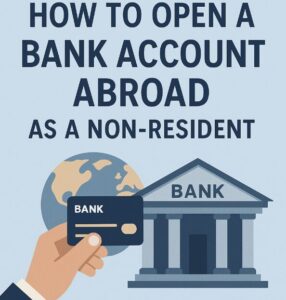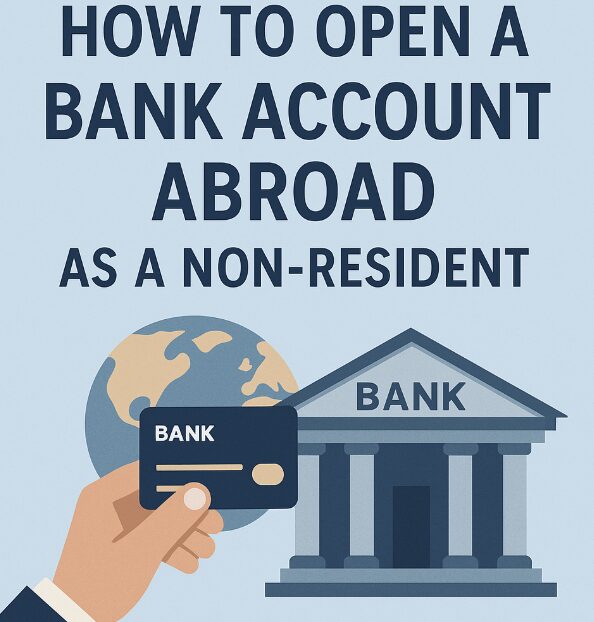Opening a bank account as a non-resident can feel like an overwhelming task. But whether you’re a traveler, digital nomad, international student, or remote worker, managing your finances abroad doesn’t have to be complicated. With the rise of global banking services and digital financial platforms, non-residents now have more options than ever before.
This guide will walk you through the key steps, helpful platforms, and tips you need to successfully open and manage a bank account in a foreign country.

Understand Why You Need a Bank Account Abroad
Before you jump in, clarify your goal. Why do you need an international bank account?
For travel: To avoid foreign transaction fees and easily convert currencies.
For work: To receive payments from foreign employers or freelance platforms.
For studying: To pay tuition, rent, or manage local expenses.
For living abroad: To pay utilities, local taxes, and access government services.
Knowing your reason helps determine which type of account or service will work best for you.
Traditional Banks vs. Digital Banks
Traditional banks in countries like Germany, France, or Spain often require proof of local residence, a tax ID, or in-person appointments. While this can be feasible for expats or long-term residents, it’s not ideal for travelers or short-term workers.
Instead, non-residents often choose digital banks and fintech services. These options usually offer:
Online account setup
Multicurrency accounts
Virtual debit cards
International transfers with low fees
Some of the most popular digital banking options include:
Revolut: Known for multicurrency accounts, instant currency exchange, and travel-friendly features.
Wise: Formerly TransferWise, ideal for international money transfers and borderless accounts.
N26: A European digital bank offering accounts with IBANs, useful for receiving payments in Europe.
Monese: A UK-based digital bank that doesn’t require a UK address to open an account.
These options are often faster, cheaper, and more flexible than trying to open an account at a traditional bank.
Documents You’ll Typically Need
Even for online banks, you’ll need to prepare some basic documents:
A valid passport or national ID
Proof of address (can be in your home country)
A selfie or video call for identity verification
In some cases, proof of income or employment
Some services like Wise or Revolut may approve accounts within minutes, while others may take a few days to verify your identity.
Best Countries for Easy Bank Account Setup
Some countries are more lenient than others when it comes to non-residents opening accounts. These countries are known for their expat-friendly banking policies:
Portugal: Banks like Millennium BCP are used to working with foreigners.
Estonia: E-residency program allows you to run a business and open an EU account.
Georgia (the country): Simple process, no minimum deposit, and English-speaking staff.
Mexico and Thailand: Some banks allow foreign residents with tourist visas to open accounts.
If you’re planning to stay long-term in any country, visiting a branch with all your documents may still be worthwhile.
Fees, Currency Conversion, and ATM Access
One of the biggest benefits of using digital banks like Wise and Revolut is the cost efficiency:
Low or no monthly fees
Competitive exchange rates
Free or cheap ATM withdrawals abroad
No surprise charges for using your card overseas
Always check if the bank/platform offers a local currency balance to avoid extra conversion fees. And keep in mind some services limit free ATM withdrawals monthly, so plan accordingly.
Sending and Receiving Money Internationally
If you’re working with international clients or need to send money back home, choose services that specialize in fast and affordable transfers:
Wise: Transparent fees and great exchange rates
Revolut: Good for peer-to-peer transfers and crypto trading
Payoneer: Ideal for freelancers and receiving payments from platforms like Upwork
Many of these platforms let you generate local bank details (e.g., UK sort code and account number, US routing number) so you can receive payments like a local.
Tax and Legal Considerations
Opening a bank account abroad may have tax implications in your home country. Some countries require you to report foreign accounts, especially if they hold a certain balance.
Check whether the account you open will generate interest income, and if that income needs to be declared. Platforms like Wise or Revolut typically do not pay interest, which can simplify tax reporting.
Also, make sure your bank complies with FATCA or CRS (Common Reporting Standard) regulations if you’re a US citizen or from a country with strict tax laws.
Choosing the Right Banking Option for You
If you’re mostly traveling and need flexibility, Revolut or Wise are ideal. If you’re settling into a European country, N26 or Monese might be better suited. For business owners, Payoneer or setting up an Estonian e-residency can open more doors.
In any case, don’t rely solely on one bank. Having a backup card or account can save you in emergencies.
Getting Started with an Account Today
Ready to open your first bank account abroad?
Explore Revolut for multicurrency accounts and a simple sign-up process. Check out Wise if your focus is on sending or receiving international payments.
Compare each platform’s features and fees based on your specific lifestyle and location. Opening a non-resident bank account has never been more accessible, and with a few clicks, you can take control of your finances no matter where you are in the world.
